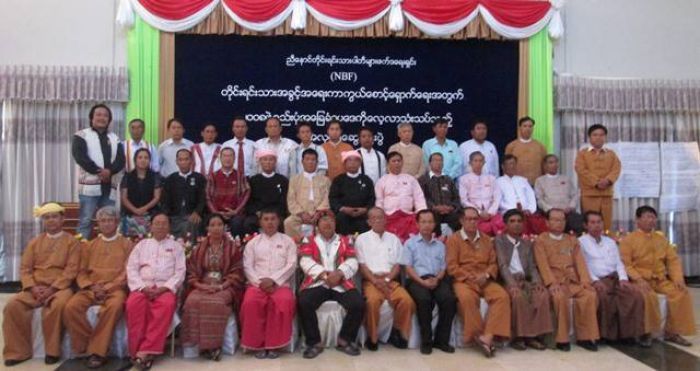The issue of minority representation in the government has heated up recently as Burma’s parliament considers a Copernican electoral reform proposal in the lead-up to by-elections later this year and a general election in 2015. As the nation weighs the current “first past the post” system against proportional representation, a nationwide debate has sprung up around which electoral method will be most effective, as well as preventing political blocs that could overpower smaller parties.
Burma’s two biggest parties are the ruling Union Solidarity and Development Party and the opposition National League for Democracy. But there are many other distinct political platforms in Burma representing alternative views, as well as ethnic and religious minorities.
DVB’s Shwe Aung recently spoke with Saw Than Myint, co-founder of the multi-ethnic Federal Union Party (FUP). Saw Than Myint, who is also the spokesperson for the Nationalities Brotherhood Federation (NBF), explained the history of the two parties and their vision for the coming elections. The FUP, which was formed in 2013 by members of the NBF, campaigns primarily in regions with a Burmese majority to complement the NBF’s strong support in ethnic areas.
Q: How many constituencies will the NBF and FUP be contesting in the next by-election?
A: The NBF is looking to field candidates in all three parliaments [the Union parliament and both houses of the bicameral parliament], representing all seven of Burma’s ethnic regions. The FUP, which competes in mainland areas, will field four candidates in Rangoon, one in Mandalay and one in Mon State. We will contest in Mon State because the Mon party, which is a member of the NBF, doesn’t currently have a candidate for the Thaton constituency. They suggested that we run in the elections there. We have shortlisted candidates but have not made any final decisions.
Q: What is your nomination procedure?
A: In the FUP, party members have to adhere to an agreement not to betray the party. What we saw in the first half of 2014 was that many representatives switched parties after winning seats in the parliament, which we see as disloyal. In order to prevent this, we favour appointment of individuals who will be faithful to the party. Right now we have about three to four nominees in each constituency that we plan to contest in the by-elections, but we won’t make our final decision until the election dates are announced.
Q: What other criteria do you look for in a candidate, besides loyalty?
A: First, a candidate must be loyal to the party and second, they must have a strong personal background. Lastly, they must have a college degree. If there are two candidates that are equally qualified, we will favour a female candidate over a male.
Q: How do you expect the FUP and the NBF to fare in the by-elections?
A: As for the NBF, we are confident that we can win every ethnic constituency that we campaign for. The FUP will contest in mainland areas with more parties, and we are viewing the upcoming elections as our introduction to the public. We are hopeful, however, that we will win seats in three constituencies.
[related]



